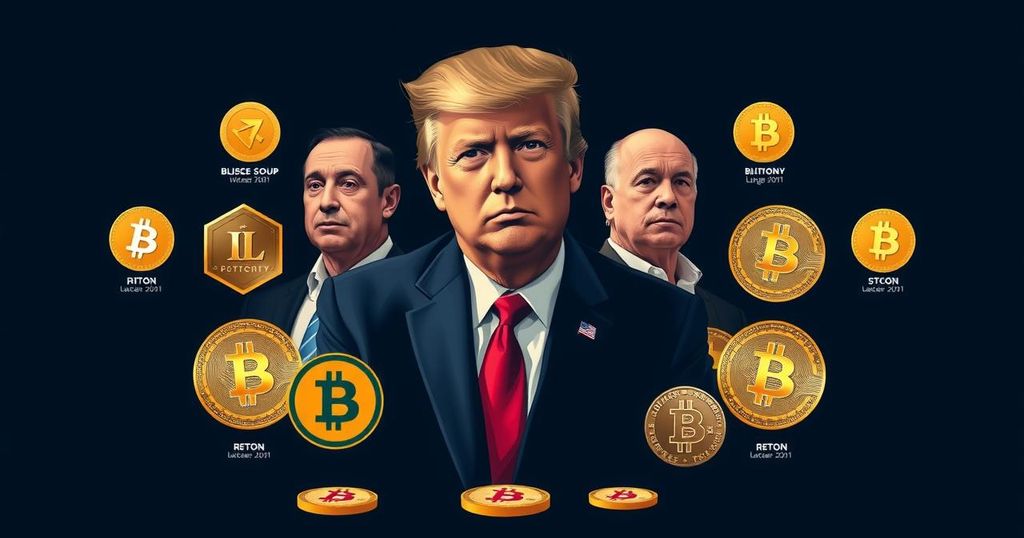Crypto
ADVISORY COUNCIL, ARMSTRONG, BITCOIN MINING, BRIAN ARMSTRONG, COINBASE, COUNCIL, CRYPTOCURRENCY, DONALD TRUMP, KEVIN WARSH, MAR - A - LAGO, NATIONAL SECURITY, NORTH AMERICA, OFFICE OF GOVERNMENT ETHICS, OGE, SEC, TREASURY, TRUMP, UNCHAINED, UNITED STATES, US ELECTIONS, WHITE HOUSE
Nina Oliviera
0 Comments
Trump’s Vision for a Crypto Czar and Advisory Council: Candidates and Controversies
Trump’s team is weighing candidates for a new ‘crypto czar’ and advisory council focused on cryptocurrency regulation. Coinbase CEO Brian Armstrong is likely a candidate for the advisory council due to ethics restrictions. Speculation includes potential roles for figures like Chris Giancarlo, while discussions around the council’s composition are ongoing, reflecting uncertainty and evolving possibilities for the crypto regulatory landscape.
As the crypto world buzzes with anticipation, glimpses into Trump’s plans for cryptocurrency governance are surfacing, centered around the potential appointment of a “crypto czar.” This pivotal figure would likely oversee a newly created advisory council, a promise made by Trump at the Bitcoin 2024 conference earlier in July. Candidates for these positions are currently shrouded in speculation. Notably, insiders hint Coinbase CEO Brian Armstrong may only fit into the advisory council due to current ethics limitations that would disqualify him from a White House role.
Details remain fluid, with the prospect of a policy-savvy crypto czar and the dynamics of the advisory council creating a complex web of possibilities. Those considered for the advisory group include notable figures like venture capitalist Marc Andreessen and the Winklevoss twins, each possessing deep ties to both the crypto realm and Trump’s campaign.
These discussions unfold against the backdrop of an uncertain regulatory landscape framed by the OGE’s restrictions, leading sources to question whether new appointments might arise amid ongoing ethical debates. The current head of OGE, who could clear any roadblocks, remains in an acting capacity. The ripple effects of such appointments could reshape the crypto dialogue in Washington, reflecting Trump’s past patterns of neglecting restrictions for preferred candidates.
Former CFTC Chair Chris Giancarlo, dubbed “Crypto Dad” for his advocacy, has emerged as a potential candidate for the crypto czar position, though he’s denied interest in other high-profile roles within the administration. Speculation swirls, as Giancarlo’s entrenched connections with the Trump administration could render him an essential asset for guiding crypto policy. However, whether he holds any personal crypto assets remains unconfirmed.
With the Trump administration warming to the cryptocurrency discourse, the formation of an effective team could redefine how digital currencies interface with traditional financial systems. The uncertainty and limitless potential of who may fill these roles cast a captivating shadow over what lies ahead, enticing both supporters and critics of Trump’s vision for crypto regulation to watch closely.
Beneath the surface of policy discussions and political maneuvering, the cryptosphere brims with questions and possibilities as speculation over appointments ignites avid curiosity among enthusiasts and investors alike. Each twist in this tale promises a possible future steeped in innovation or caution, all hinging on the decisions made in these pivotal coming months.
The recent developments concerning Donald Trump’s approach to cryptocurrency reflect a growing recognition of the sector’s influence and significance. Traditionally, the role of crypto czar aims to bridge the gap between digital currencies and regulatory frameworks, ensuring that their growth aligns with national interests. Trump’s administration has indicated a willingness to establish a dedicated advisory council, emphasizing the need for leaders who understand both the nuances of crypto investment and the broader policy implications. Meanwhile, the discussion around candidates highlights the intricate dance between governmental ethics and expertise, particularly in light of the restrictions imposed by the Office of Government Ethics.
In conclusion, the unfolding narrative surrounding Trump’s potential appointments in the crypto sector is simultaneously complex and fascinating. The hope for innovative leadership reflects a recognition of cryptocurrency’s growing importance, while the ethics of candidate selection remain a point of contention. With prominent figures being considered for the advisory council and a crypto czar, the future could herald significant shifts in financial regulation in the United States, driven by a policy-savvy and forward-thinking administration that recognizes the power of digital currencies.
Original Source: unchainedcrypto.com




Post Comment